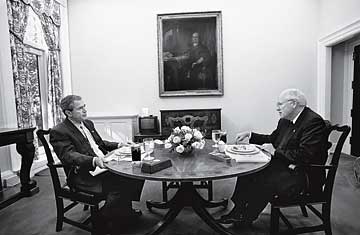
Bush and Cheney, pictured in October 2001, planned the war on terrorism but broke over whether to pardon one of its key architects
(2 of 9)
As Attorney General Eric Holder weighs whether to name a special prosecutor to probe reports of detainee abuse during the Bush era, Democratic lawmakers are trying to determine why Cheney demanded that Congress be kept in the dark about some covert CIA plans after 9/11. There is no guarantee that these and other probes won't at some point require the testimony of the former President and Vice President. While Bush has retired to Texas to write his memoirs and secure his legacy by other means, Cheney is settling in for a long siege in Washington, where he will soon be installed in a conservative think tank and where, Republicans say, he will pull levers on Capitol Hill to make his voice heard. Above all, Cheney will continue to insist that the Commander in Chief and his lieutenants had almost limitless power in the war on terrorism and deserved a measure of immunity for taking part in that fight. That's a conviction Cheney made clear to all those involved in the Libby affair--including, in his final hours in power, the President himself.
The Commutation Fail-Safe
This Libby-Pardon fight--an account pieced together from dozens of interviews with former officials who agreed to speak only without attribution--began two years earlier, in the federal district courthouse in Washington. In a case that gripped the capital but often mystified the rest of the country, Cheney's former top aide on domestic and foreign policy stood accused of obstructing a federal investigation into the source of an egregious media leak: the identity of an undercover CIA officer named Valerie Plame. Her husband Joseph Wilson, a former diplomat, had written an Op-Ed for the New York Times in July 2003 claiming to have evidence that the Administration had lied to bolster the case for war in Iraq. Within days, in an effort to discredit Wilson's story, a conservative columnist had revealed the identify of Wilson's wife. Plame's "outing" was seen by her husband and his fellow Democrats as an act of revenge orchestrated by Cheney himself--and the most extreme example of how far an Administration would go to cover its tracks in a war gone bad.
Libby maintained his innocence throughout his trial, claiming that any false statements he had made to investigators resulted from bad memory, not deception. But Libby had reason to lie: his job was at stake, and his boss's was on the line too. Bush had declared that anyone involved in leaking Plame's identity would be fired. Cheney had personally assured Bush early on that his aide wasn't involved, even persuading the President to exonerate Libby publicly through a spokesman. Special counsel Patrick Fitzgerald, who prosecuted the case, said Libby's obstruction had prevented investigators from uncovering the truth about Cheney's role. "There is a cloud over the Vice President," Fitzgerald said in his closing arguments. (Matthew Cooper, then a Time correspondent, was a witness in the case against Libby. Cooper had spoken to both Libby and Bush aide Karl Rove in July 2003 about Wilson's relationship to Plame. Time Inc. turned Cooper's notes over to Fitzgerald after fighting the subpoena all the way to the Supreme Court, which declined to hear Time Inc.'s appeal. Rove was not indicted.)
